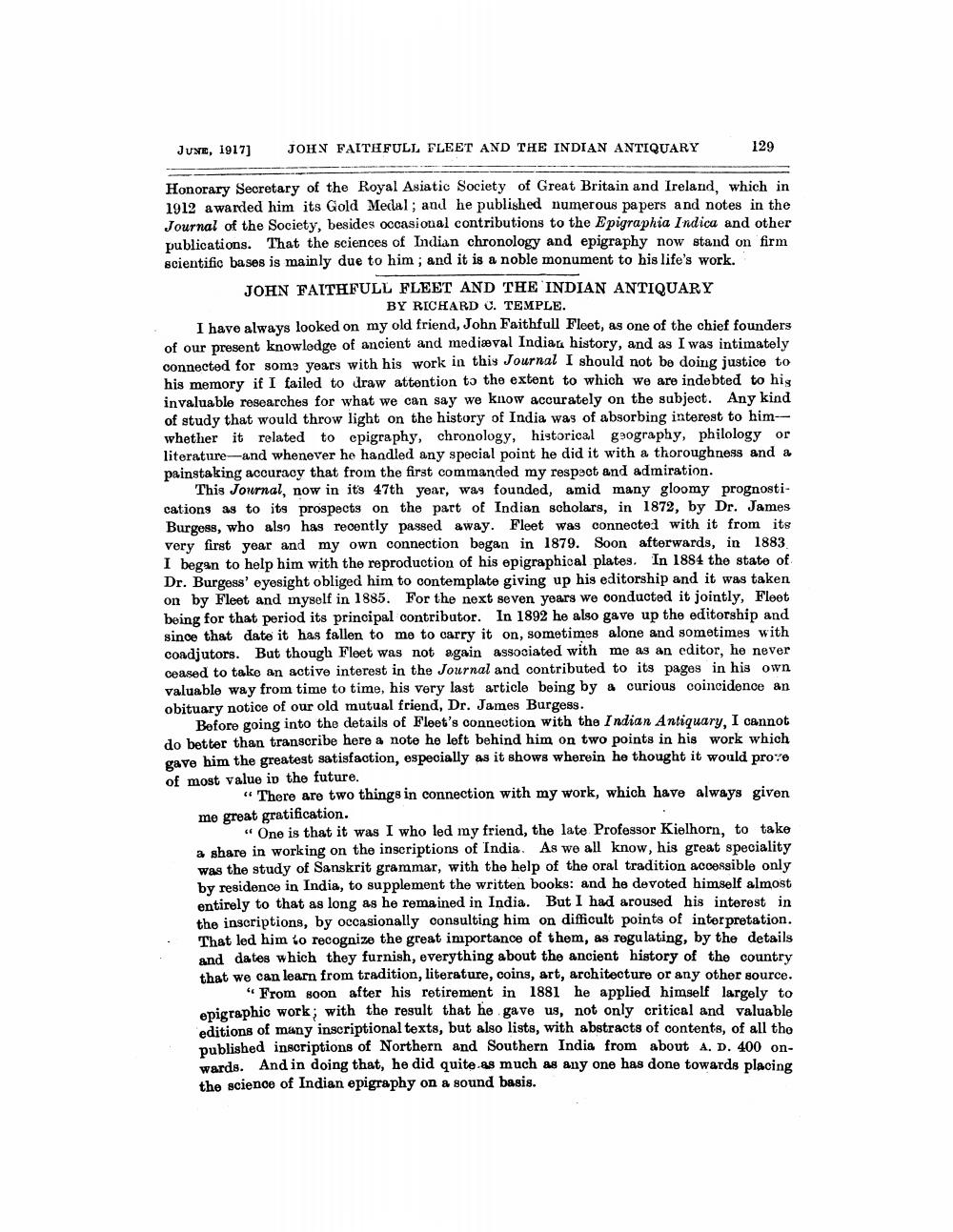________________
JUNE, 1917)
JOHN FAITHFULL FLEET AND THE INDIAN ANTIQUARY
129
Honorary Secretary of the Royal Asiatic Society of Great Britain and Ireland, which in 1912 awarded him its Gold Medal; and he published numerous papers and notes in the Journal of the Society, besides occasional contributions to the Epigraphia Indica and other publications. That the sciences of Indian chronology and epigraphy now stand on firm scientific bases is mainly due to him; and it is a noble monument to his life's work. JOHN FAITHFULL FLEET AND THE INDIAN ANTIQUARY
BY RICHARD U. TEMPLE. I have always looked on my old friend, John Faithfull Fleet, as one of the chief founders of our present knowledge of ancient and mediæval Indian history, and as I was intimately connected for some years with his work in this Journal I should not be doing justice to his memory if I failed to draw attention to the extent to which we are indebted to hig invaluable researches for what we can say we know accurately on the subject. Any kind of study that would throw light on the history of India was of absorbing interest to him whether it related to epigraphy, chronology, historical geography, philology or literature and whenever he handled any special point he did it with a thoroughness and a painstaking accuracy that from the first commanded my respect and admiration.
This Journal, now in its 47th year, was founded, amid many gloomy prognostications as to its prospects on the part of Indian scholars, in 1872, by Dr. James Burgess, who also has recently passed away. Fleet was connected with it from its very first year and my own connection began in 1879. Soon afterwards, in 1883 I began to help him with the reproduction of his epigraphical plates. In 1884 the state of Dr. Burgess' eyesight obliged him to contemplate giving up his editorship and it was taken on by Fleet and myself in 1885. For the next seven years we conducted it jointly, Fleet being for that period its principal contributor. In 1892 he also gave up the editorship and since that date it has fallen to me to carry it on, sometimes alone and sometimes with coadjutors. But though Fleet was not again associated with me as an editor, he never ceased to take an active interest in the Journal and contributed to its pages in his own valuable way from time to time, his very last article being by & curious coincidence an obituary notice of our old mutual friend, Dr. James Burgess.
Before going into the details of Fleet's connection with the Indian Antiquary, I cannot do better than transcribe here a note he left behind him on two points in his work which gave him the greatest satisfaction, especially as it shows wherein he thought it would prore of most value in the future.
“There are two things in connection with my work, which have always given me great gratification.
"One is that it was I who led my friend, the late Professor Kielhorn, to take a share in working on the inscriptions of India. As we all know, his great speciality was the study of Sanskrit grammar, with the help of the oral tradition accessible only by residence in India, to supplement the written books: and he devoted himself almost entirely to that as long as he remained in India. But I had aroused his interest in the inscriptions, by occasionally consulting him on difficult points of interpretation. That led him to recognize the great importance of them, as regulating, by the details and dates which they furnish, everything about the ancient history of the country that we can learn from tradition, literature, coins, art, architecture or any other source.
"From soon after his retirement in 1881 he applied himself largely to epigraphic work; with the result that he gave us, not only critical and valuable editions of many inscriptional texts, but also lists, with abstracts of contents, of all the published inscriptions of Northern and Southern India from about A. D. 400 onwards. And in doing that, he did quite as much as any one has done towards placing the science of Indian epigraphy on a sound basis.




